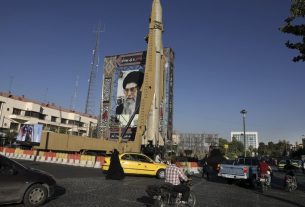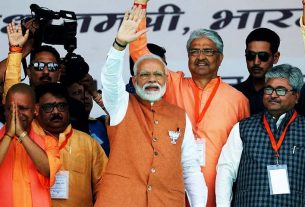JERUSALEM: Israel’s president on Sunday rejected parliament speaker Benny Gantz’s request for more time to form a government, a task that could now fall to Prime Minister Benjamin Netanyahu.
Ex-military chief Gantz was given the mandate to form a government four weeks ago by President Reuven Rivlin following Israel’s March 2 election, the country’s third inconclusive vote within a year.
But Gantz’s prospects for forming a stable coalition were always remote given deep divisions within the anti-Netanyahu camp.
The pro-Netanyahu bloc, including the veteran premier’s right-wing Likud and several religious parties, also remained short of a majority after last month’s vote.
In a surprise move last month, Gantz was elected speaker of Israel’s parliament, or Knesset.
With the number of confirmed Covid-19 cases in Israel rising, he pledged to use that powerful position to seek an emergency unity alliance with Netanyahu to tackle the pandemic and unblock a grinding year-long political stalemate.
While Gantz’s mandate to form a government technically runs until the end of Monday, he was no longer actively seeking to forge a coalition with himself as prime minister.
Instead, he was widely believed to be pursuing a deal that would see Netanyahu remain as premier for a defined period, possibly then handing power to Gantz.
Despite reports of progress from the two sides, and from Israeli media, no deal has been announced.
Late Saturday, Gantz asked Rivlin for an extension of his mandate.
In response, Rivlin told Gantz “that in the current circumstances no extension would be possible”, a statement from the president’s office said.
“The president made his decision after also speaking to … Netanyahu, who did not confirm in their conversation that the parties are close to signing an agreement that would lead to a unity government,” the statement said.
If no unity agreement is reached by the end of Monday, Rivlin said he would ask the Knesset to nominate a candidate to become prime minister.
The Netanyahu bloc currently holds 59 of the Knesset’s 120 seats.
It is therefore possible, but not certain, that the legislature would give the premier a 14-day window to form a government.
Blue and White, the centrist alliance led by Gantz, said in a statement that “the attempts by the negotiating teams to arrive at a unity government are still ongoing”.
Likud said it too remained open to forming a unity government. Likud stressed that the president gave both Netanyahu and Gantz a chance to build a government following the inconclusive votes in September, and should do so again.
But with Israel’s confirmed Covid-19 caseload nearing 11,000, there remain widespread calls from across the political spectrum for a unity alliance, even for a short term.
University of Tel Aviv political science professor Emmanuel Navon said that “a unity government remains the most likely option”. But, he added, any number of scenarios could play out, including a fourth election.
Netanyahu, in office since 2009, is Israel’s longest-serving premier and the first to be indicted while in office.



